Recently I am trying to find a handy tool to measure the performance of my Java application and finally I think the VisualVM provided by JDK is the ideal one. This blog is written based on JDK1.7 + Eclipse 4.3.2.
What is VisualVM
It is a tool automatically available after JDK is installed. The executable file could be found on your /bin as displayed below.
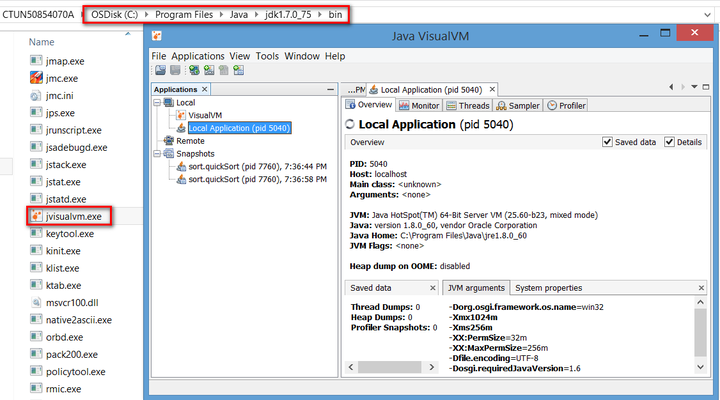
In order to measure the performance of your application, it is necessary for the application to be recognized by VisualVM first. There is a plugin named “VisualVM launcher for Eclipse” which can help us about it.
Install and configure VisualVM launcher
(1) download the zip from http://visualvm.java.net/eclipse-launcher.html. Unzip the file and put it to the plugin folder of your Eclipse installation folder. In my laptop it looks like below. There should be a site.xml inside the unzipped folder.

(2) In Eclipse, choose menu “Help->Install New Software”, click “Local”, add locate the folder to the one you finish in step1.
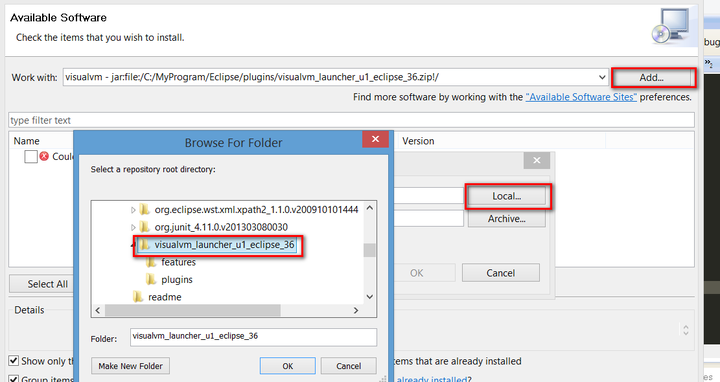
Then the local downloaded plugin is successfully parsed and ready for install.
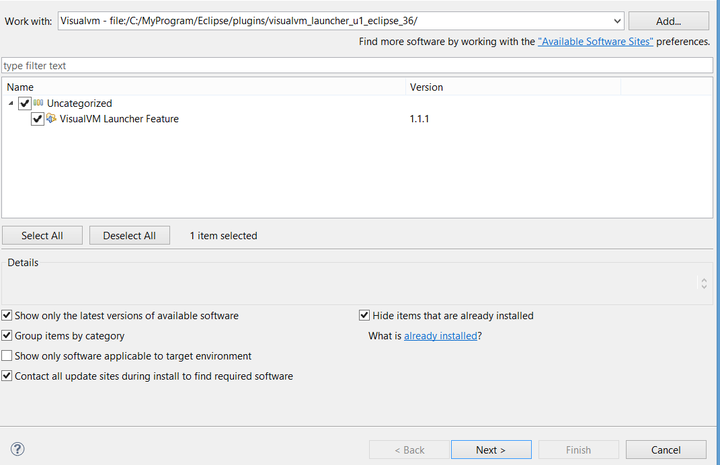
finish the installation.
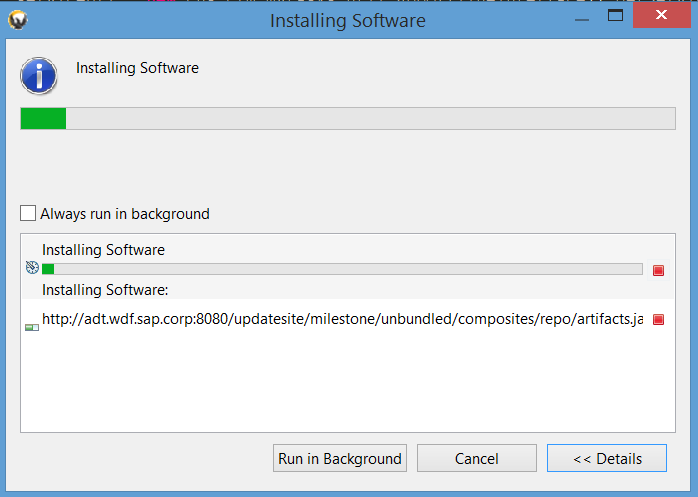
(3) Restart Eclipse, then you can find a new option via the path below. Configure two paths accordingly.
For “JDK Home”, if you configure the JRE path by mistake, later when you try to measure your application, the VisualVM will fail to load with the following error message:
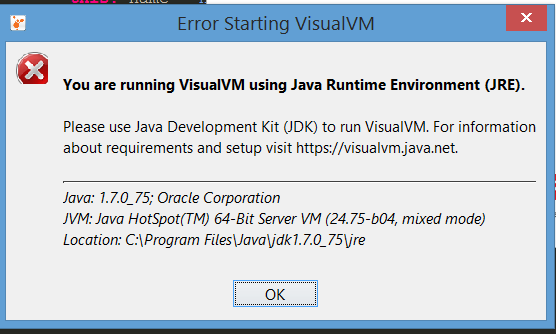
Now the plugin is ready to use.
Do performance measurement
(1) Select your Java project, choose context menu “Run as”->”Run configuration”, create a new Application configuration by specifying VisualVM launcher as its launcher, instead of the default Eclipse JDT launcher.
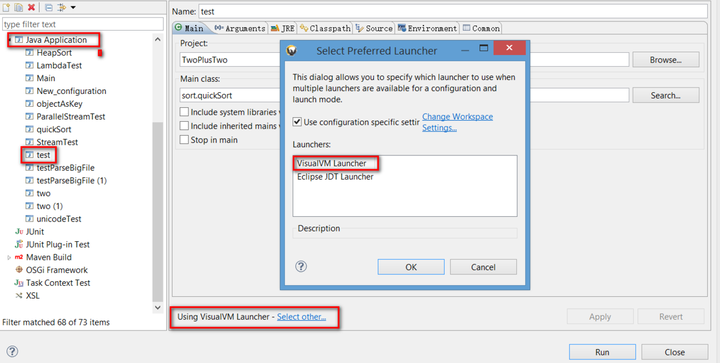
(2) For example I have a Java application which sorts an array by QuickSort algorithm written by myself and I would like to get its performance data, then I set a breakpoint on line 57, before my main logic is executed. Then launch the application in debugging mode with the application configuration created in previous step. Afterwards VisualVM will automatically be launched and successfully recognize the execution of my application. Click Profiler tab:
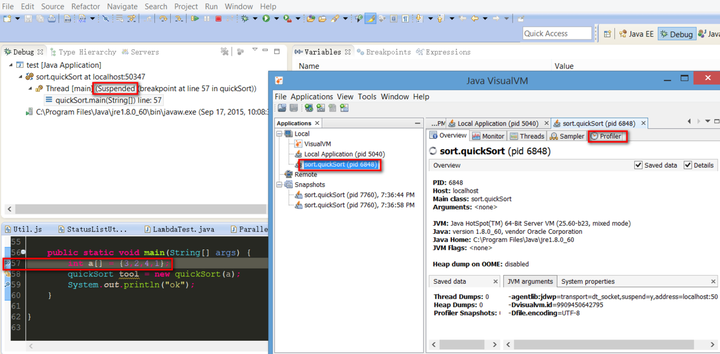
Current status: profiling inactive. Click CPU button:
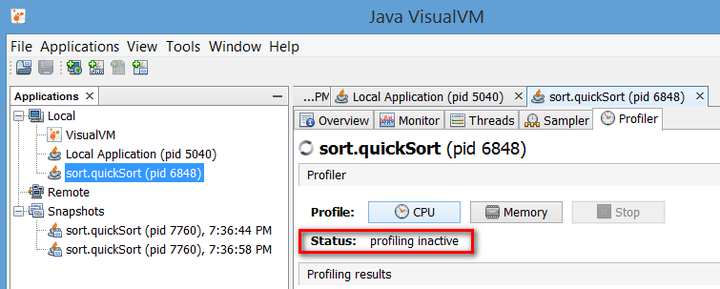
Now profiling is activated:
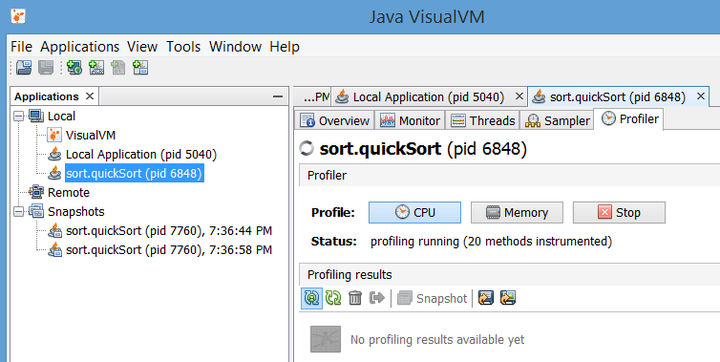
(3) Go back to Eclipse and click F8 to finish execution. Once finished, VisualVM will immediately capture this event and notify you. Just click Yes to get performance result.
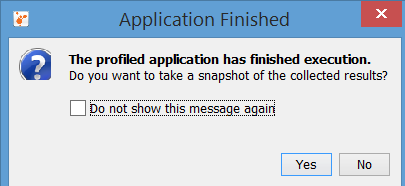
The result is displayed as below:
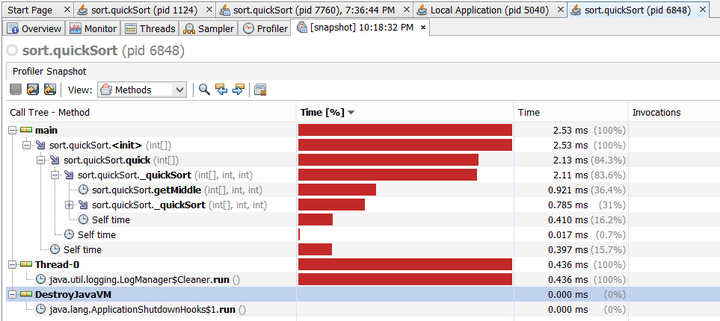
要获取更多Jerry的原创文章,请关注公众号"汪子熙":








相关推荐
YourKit是一个java性能分析工具,使用YourKit可以对java应用程序的CPU和内存进行分析操作,且支持在Eclipse、NetBeans、Intellij IDEA等集成开发环境中使用。 3.Jetm Jetm是一个java程序执行时间测量工具,可以...
理解这些参数的意义和如何根据应用需求调整,对于优化Java应用性能至关重要。 最后,代码质量和架构设计也对性能有直接影响。遵循SOLID原则,编写可测试和可扩展的代码,使用模块化和面向服务的设计,能够提高代码...
JVM是Java应用程序的基础,对其进行调优能显著提升性能: 1. **JVM参数设置**:如-Xms和-Xmx控制堆内存大小,-XX:NewRatio调整年轻代和老年代比例。 2. **垃圾回收优化**:选择合适的垃圾收集器(如G1、ZGC),调整...
### Java性能优化实战知识点概述 #### 一、理论分析篇 **1.1 性能优化的衡量指标及注意事项** - **衡量指标**: 包括响应时间、吞吐量、资源利用率等。 - **注意事项**: 在进行性能优化时,需确保优化方案不会引入...
在Java编程领域,性能优化是提升应用程序效率的关键环节。这份名为"Java编程性能优化技巧有哪些共7页.pdf.zip...在进行性能优化时,应遵循"先测量再优化"的原则,通过性能测试工具找出真正的问题所在,避免盲目优化。
Java性能优化是一个重要的主题,尤其...使用工具如JProfiler、VisualVM等进行性能监控,找出性能瓶颈,针对性地进行优化。同时,要记住过度优化可能导致代码可读性和可维护性降低,应该在性能和可维护性之间找到平衡。
针对分布式环境下的Java应用程序,本书还特别提供了专门章节来讨论相关的调优策略和技术。 #### 六、系统级调优 ##### 6.1 操作系统级调优 除了代码层面的优化之外,操作系统级别的配置也是提高整体性能的重要手段...
在开发和维护Java Web应用程序时,性能调优是一项至关重要的任务,它能够确保系统的高效运行,减少延迟,提高用户体验。本文档将详细讲解Java Web系统性能调优的过程,主要关注JVM(Java Virtual Machine)的优化。 ...
VisualVM是一款由Oracle提供的免费软件,它整合了多种JDK命令行工具,如jconsole、jmap、jhat等,为开发者提供了丰富的可视化界面,帮助他们更好地理解和优化Java应用程序的运行状态。 在VisualGC中,你可以实时...
在Java性能调优的过程中,了解操作系统工具和分析是至关重要的,因为这可以帮助我们洞察应用程序内部...因此,深入理解和熟练使用各种性能分析工具,结合实际操作系统的监控数据,对于Java应用程序的性能调优至关重要。
例如,使用`PreMain-Class`参数启动Java应用,加载带有`Premain-Class`的代理类。 2. **第三方工具**: 工具如`VisualVM`和`JProfiler`提供图形界面,可以直接查看对象的内存占用情况,包括对象的总大小、实例字段...
例如,JProfiler、VisualVM和YourKit等是常见的Java探针工具,它们提供了丰富的视图和报告来帮助开发者优化应用性能。 然后,让我们探讨Mock框架。在软件开发中,单元测试是确保代码质量的关键步骤。Mock框架如...
《Java Performance Tuning》是一本由O'Reilly出版社出版的专业书籍,主要聚焦于Java应用程序的性能优化技术。本书详细介绍了如何诊断和解决Java应用程序中的性能瓶颈,并提供了一系列实用的工具和技术,帮助开发者...
4. **性能分析工具**:如VisualVM,它可以监控Java应用的内存使用、CPU消耗,帮助找出性能瓶颈。 5. **代码覆盖率工具**:JaCoCo用于测量代码测试覆盖程度,确保测试的全面性。 6. **代码重构工具**:IntelliJ ...
- 介绍常用的性能测量工具和技术,如CPU时间、响应时间等。 - **概要工具**(2.2节) - 概述如何利用各种工具来进行性能分析,例如Java VisualVM、JProfiler等。 #### 三、虚拟机版本的影响 - **虚拟机(VM)版本*...
6. **并发性能优化**:在性能优化方面,书中分析了如何测量和调整并发程序的性能,包括使用 JConsole 和 VisualVM 工具进行监控,以及如何通过调整线程池参数来优化程序性能。 7. **实战案例**:书中的每个概念都...
- **技术策略上的性能优化**:从Java语言层面优化代码,如使用`StringBuffer`而非`String`进行字符串拼接;在J2EE层面采用连接池机制减少数据库连接的开销,使用`PreparedStatement`和`CallableStatement`处理SQL...
源码中可能存在性能测试代码,如使用JProfiler或VisualVM进行性能监控,以及针对性的性能调优。 7. **代码审查(PSPproject7)**:代码审查是确保代码质量和团队协作的重要步骤。源码可能包括了代码审查工具的集成...
为了进行性能测试,开发者可能使用了Java的内置工具,如`System.currentTimeMillis()`或`java.time.Instant`来测量代码执行时间。此外,第三方库如JProfiler或VisualVM也可能被用来获取更详细的性能指标,如CPU使用...
5. **性能优化**:监控应用性能数据,如加载速度、内存占用等,确保应用流畅运行。Java中的性能分析工具,如JProfiler和VisualVM,可以帮助识别和解决性能瓶颈。 6. **反馈机制**:鼓励用户提供反馈,及时修复问题...